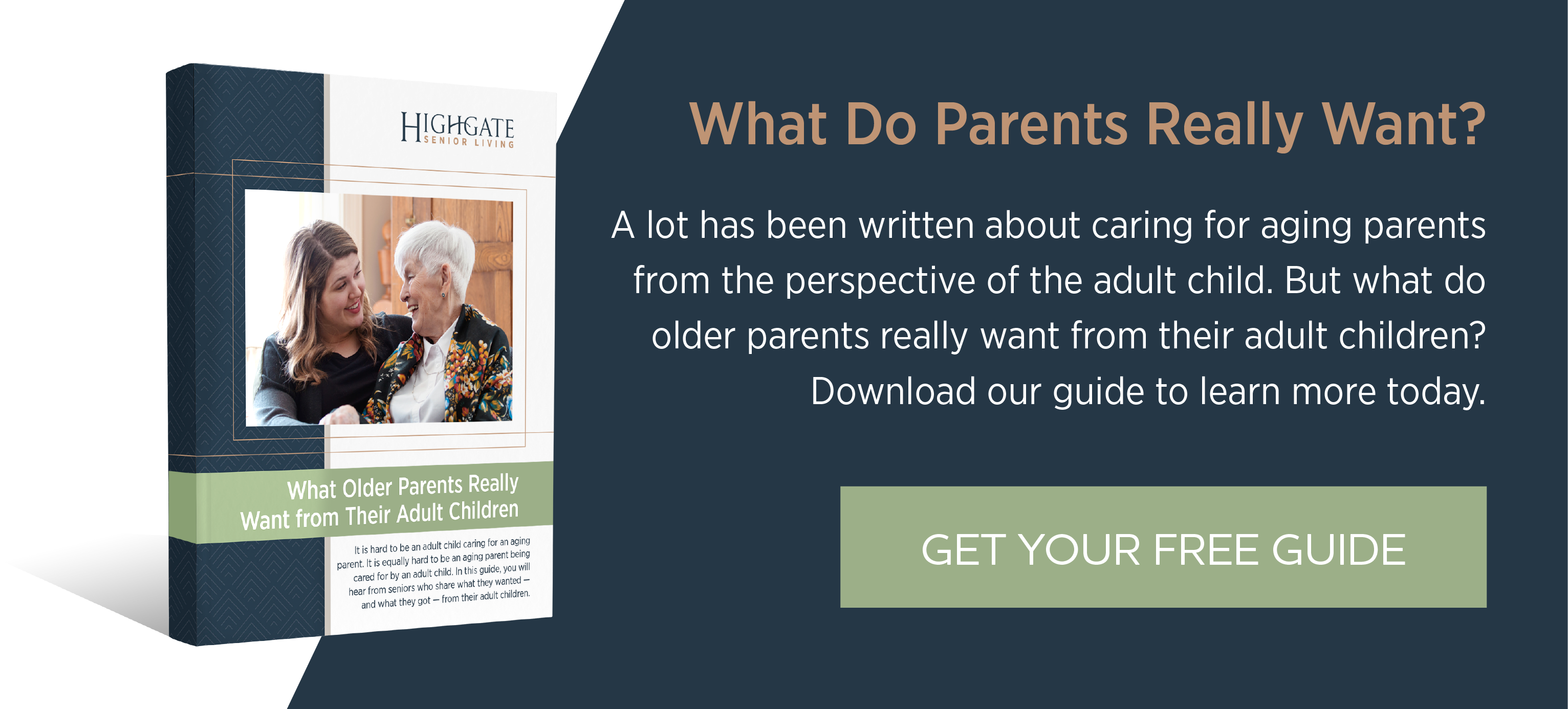
We live in an individualistic society, where strength, self-reliance, assertiveness, and independence are considered good traits to have. So as older adults start to need assistance, it’s common for them to resist accepting help from anyone — especially from their own family.
The problem is, very few people, if any, make it through life without needing help at some point. Sometimes providing support can be fairly straightforward, like help with transportation, shopping, or household chores. In other cases, family caregivers find themselves having to take on quite a lot due to health issues that can affect a person’s ability to manage various aspects of life, like medication management, grooming and personal hygiene, and paying bills.
When an older person does start to need help, it tends to be close family members, and often adult children, who step in. Yet nearly 50% of aging parents say they’re worried about being a burden to their adult children.
Why Your Parents Resist Asking for Help
Many of us resist the idea of being dependent on others. We like being able to find our own way and make decisions ourselves. But this pattern becomes even more prevalent as we age.
Your parents might be worried about complicating your already busy life. They are still your parents after all. They worry about you and your own health and happiness — and they don’t want to burden you with their problems when you have a complicated life of your own.
They might be afraid that by asking for help they’re losing control. It can be frustrating to ask for help with things you were once capable of handling and managing yourself, and your parents might just feel guilty that they can’t do it all alone.
Or your parents might be concerned that you’ll worry too much. They don’t want to be parented by their children.
But if your parent keeps secrets because they don’t want to be a burden, they can end up putting themselves in danger and increasing the likelihood that they will have to rely on others to care for them.
Signs Your Parent Needs Help But Is Afraid to Ask
There’s definitely a fine line between caring and controlling, and there’s a necessary balance between respecting your parent’s right to privacy and encouraging them to share information that’s important for you to know so an emergency can be avoided, especially when it comes to important information about their health, safety, or general well-being.
Although your parent might not be forthcoming with information, there are a few things you can look for.
1. Unexplained Bruising
If you see a bruise on your mother’s arm or leg, it could mean she’s fallen and isn’t telling you. Not only can falls lead to injuries or worse, but the fear of falling can even keep your parent from being active and thriving. Because they’re anxious about falling, they unintentionally isolate themselves in the place where most falls happen — at home — and further increase their risk of physical decline, depression, feelings of helplessness — and falls.
In addition to looking for covered-up bruises, look for if your parent is holding onto walls or furniture as they walk through the house. This can be a sign they’re unsteady on their feet and would benefit from a cane or walker.
2. Piles of Unpaid Bills
Paying bills is one of the first tasks aging parents lose track of, yet many older adults downplay money troubles in hopes that they can continue living on their own without asking for help or worrying their kids.
Keep your eyes peeled for unopened personal mail or bills; letters from banks, creditors, or insurers; and thank-you messages from charities. Individually, these might not be issues. However, if you find a lot of mail scattered around and unopened bills, this can indicate that your loved one is having difficulty managing their finances.
3. Avoiding Driving
Another common conversation aging parents typically avoid is about their driving. Maybe your dad didn’t tell you about finding his keys in the freezer or getting lost on his drive home from church to keep you from worrying he’s losing his memory. Perhaps driving has become stressful, confusing, or exhausting.
Or maybe he’s more worried that if he tells you, his driving days will come to an end. For many seniors, letting go of the ability to drive means letting go of their ability to get out of the house, connect with friends, run to the grocery store, and more. It also means relying on others for transportation, which just adds to the fear many aging parents have of “becoming a burden.”
4. Weight Loss or Gain
A sudden change in appearance can indicate trouble. Perhaps your mom is having trouble getting to the grocery store or remembering how to cook her favorite recipes, so she’s experiencing noticeable weight loss. Or maybe your father is indulging in meals and snacks all day long or eating a diet of mostly packaged goods, so he’s gaining weight.
If your parents have begun subsisting on boxed and canned food, that can be a sign that taking care of themselves is getting harder.
5. Being Constantly Worried or Constant Complaining
For many seniors, criticism and pessimism grow with age. The good news is most negative emotions — anger, disgust, fear, sadness — have a root cause.
Perhaps your loved one is actually dealing with chronic pain. Not only can it be frustrating and upsetting to have to deal with chronic pain, but the ripple effect is also profound. Pain often leads to sleep loss, which can lead to mood changes and then to depression and cognitive decline. It also often leads to decreased activity, and many older adults get frustrated when they realize that they can’t move the way they used to or if they perceive that they’re losing some of their independence.
It could also be anxiety, boredom, or depression. If your loved one doesn’t have social connections or a sense of purpose, it might be easy to fixate on the negative aspects of their lives or actively seek things to gripe about.
How to Help a Parent Who Doesn’t Ask
It can be incredibly frustrating to want to help your aging parent as they helped you when you were younger only to be told that they’re fine on their own.
The first step is opening up the line of communication by asking them how they would like to age, where they want to be, and so on, senior care experts say. This empowers them to talk about their feelings and allows you to work with them to make a plan to help them maintain their independence while also ensuring their safety and quality of life.
For advice from aging parents themselves, download our eBook What Older Parents Really Want from Their Adult Children.






